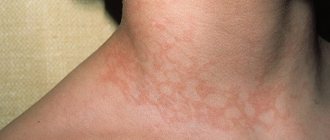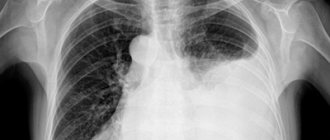Hoarseness of voice is an inflammatory process in which the mucous membrane of the vocal folds is involved, causing the disease. The prerequisites for the occurrence of a problem can be both physiological and psychogenic, emotional in nature. Our vocal apparatus is a complex mechanism consisting of interconnected areas controlled by the central nervous system. This includes the vocal apparatus, which includes groups of resonators (pharynx, trachea, lungs), and the larynx, the place where sounds are formed. If one section fails, the operation of the entire vocal apparatus is disrupted. As a result, problems arise with sound production, hoarseness and hoarseness of the voice. Let's look at common causes of the disease and, of course, talk about diagnostic and treatment methods.
“Our vocal apparatus is a complex mechanism consisting of interconnected areas controlled by the central nervous system. If one section fails, the operation of the entire vocal apparatus is disrupted.”
Causes of hoarseness
The problem can be caused by various factors. The most common ones include:
- Laryngitis.
- Disturbances in the endocrine system.
- Excessive tension in the vocal folds.
- Stress, strong negative emotions.
Laryngitis is the most common cause of hoarseness. The disease develops against the background of other infectious and inflammatory processes that occur in the organs of the respiratory system: bronchitis, rhinitis, tuberculosis, ARVI.
With laryngitis, pain and discomfort appear in the throat, the voice deepens, and difficulty breathing is often observed. In some cases, the temperature rises, appetite decreases, headaches, chills, and weakness in the body appear.
To treat laryngitis, topical medications are prescribed in the form of sprays. Lozenges help temporarily relieve pain. For severe coughs, mucus thinners. If the origin of laryngitis is allergic, the doctor may prescribe antihistamines. Antibiotics are used as a last resort if a bacterial infection is present.
Disturbances in the endocrine system are another factor that causes hoarseness. Often the endocrine system causes the vocal apparatus to react to disturbances that have arisen. If you suspect a disruption in the endocrine system, you should contact an endocrinologist, since the otolaryngologist does not perform the main function here. The main thing is not to self-medicate, but to consult a specialist as soon as possible.
Singers, guides, teachers, lecturers - in short, people whose profession involves constant increased load on the vocal folds - may experience overstrain.
It is important to learn how to control your voice and avoid overexertion. For this purpose, strengthening techniques have been developed that need to be practiced from time to time. You can learn more about hygiene and prevention of dysphonia for vocalists from our article.
To avoid hoarseness, you should drink water regularly, avoiding dry throat to reduce the load on the folds, especially during a long monologue or negotiations. Due to nervous tension, the voice may shrink or disappear altogether. Here we are already dealing with the psychological aspect, since the voice makes itself felt as a reaction to stress. Hoarseness often becomes a signal of neurological diseases that lead to disruption of the innervation of the folds and paralysis of the laryngeal nerves.
You should immediately consult a doctor to prevent the process from prolonging and the formation of nodules in the vocal folds. How to choose a suitable doctor is described in the article.
Another cause of hoarseness is a violation of metabolic processes in the body. If the hormone is not produced by the thyroid gland in sufficient quantities, the voice becomes dull. In addition, the mucous membrane dries out when there is a lack of fluid in the body.
Hoarseness is also common among smokers, people who enjoy irritating foods and drinks, and frequent mouth breathers. A shrunken voice can be caused by drinking alcoholic beverages, severe tension in the larynx, or decreased immunity.
Healthy voice and hoarse voice: physiology
Our throat has a complex structure. In the throat of any person there is an organ responsible for sound production. This organ is the larynx. It contains muscle folds - the vocal cords. They are very elastic. When an adult is silent, the vocal cords are open and there is a glottis between them. Sound is created when the air exhaled by the lungs passes through the vocal cords and causes them to vibrate and vibrate. If the ligaments are healthy, elastic, and not thickened, the sounds produced will be clear, sonorous, and loud. An adult begins to speak in a hoarse voice when the ligaments thicken and obstacles appear during the passage of the sound wave.
The condition when the ligaments become hoarse is called dysphonia. Loss of voice is called aphonia.
There are many reasons why you may become hoarse or hoarse. Before voicing these reasons, I would like to cite a number of interesting facts about the uniqueness of our vocal apparatus:
- Every adult's voice sounds different. The reason for this is the different length and thickness of the ligaments in the throat: in men they are longer.
- The longer an adult's larynx, the longer his vocal cords.
- The vocal cords in the throat can shorten, stretch, thicken and narrow, making them very elastic.
- Every adult's vocal cords can stretch to ten times their original size.
- You can train the ligaments to stretch, which is what professional singers do regularly when they do special exercises for the throat.
- Animals also have vocal cords in their throats, but only humans have learned to control them.
The voice of an adult is a unique instrument. Therefore, it is important to find out the reasons why he may become hoarse, hoarse, or even disappear altogether.
Initial symptoms
In the first stages, the volume of a person’s voice decreases, its quality and timbre changes. The folds quickly become tired, and it becomes uncomfortable for a person to swallow or talk. The most dangerous type of hoarseness is chronic, since in this case the entire vocal apparatus is gradually and permanently rebuilt. Subsequently, hoarseness increases and the voice weakens. When diagnosing, an otolaryngologist finds out the background and history of the development of the disease, and treatment measures taken previously. An ENT examination is performed with direct or indirect laryngoscopy. If required, the specialist will prescribe an ultrasound of the thyroid gland, MRI or computed tomography to identify possible causes of laryngeal depression.
“In the first stages, the volume of a person’s voice decreases, its quality and timbre changes. The folds quickly become tired, and it becomes uncomfortable for a person to swallow or talk.”
Nervous system diseases
Here we come to the causes of hoarseness, which are not directly related to pathologies of the ENT organs. One of these reasons is neurological. Hoarseness is caused by paralysis of the superior laryngeal nerve or recurrent laryngeal nerve. Palsy of these nerves itself is rare. It usually occurs against the background of syphilis, botulism, rabies, diphtheria, tumors of the esophagus and thyroid gland. All these diseases are very serious and can only be treated in a hospital setting. It is possible to predict whether the functions of the vocal apparatus will be restored and whether the symptoms of the disease will go away only after conducting the necessary examinations.
Also, being under constant stress or sudden fear can affect the ligaments and lead to hoarseness. In this case, complete vocal rest and the use of sedatives are indicated.
Hoarseness in children: why does it occur?
Children are just as susceptible to hoarseness as adults. There are several factors that lead to problems in the functioning of the vocal folds:
- Colds, ARVI, tracheitis. A hoarse voice may be the first sign of these diseases.
- Overstrain of the vocal folds. Often found in active, noisy children who like to scream.
- Laryngitis. The most common cause of failure, as in adults. With laryngitis, infectious inflammation occurs in the larynx, and therefore requires immediate medical attention.
Some medications can also cause children to experience hoarseness.
It should be remembered that boys undergo hormonal changes in the body between the ages of 12 and 15 . At this time, the vocal folds lengthen and the voice becomes hoarse. This is normal. If hoarseness persists for six months, there is nothing to worry about. If after this period there are no changes, and your voice remains shrunken and unnatural, you should consult a doctor.
In young children, hoarseness may indicate pathologies, for example, congenital cysts or disorders in the structure of the vocal apparatus.
From the article you will learn in detail about the causes, treatment of hoarseness in children and general recommendations for preventing the problem.
Forms of chronic laryngitis
Depending on changes in tissues, chronic laryngitis is divided into several forms1:
- Catarrhal form.
The most favorable and most common variant of the course of the disease. It is accompanied by a moderate clinical picture, hyperemia of the mucous membrane - the blood vessels are filled with blood. The main symptoms of the catarrhal form are associated with persistent hoarseness, incessant cough with sputum production. The most difficult period of the disease occurs in the morning. - Hyperplastic form.
Severe hoarseness of varying levels appears, the mucous membrane acquires a blue-red color. A characteristic sign of hyperplastic changes is thickening of the vocal cords and the appearance of nodules. This form is classified as precancerous processes. The hyperplastic form also includes dangerous forms of laryngitis - recurrent respiratory papillomatosis and Reinke's edema3. - Atrophic form.
Long-term laryngitis. Accompanied by depletion of the tissues of the larynx, pharynx, and nasal cavity. In addition to coughing, sputum appears, sometimes with bloody streaks. The main symptoms of the atrophic form are constant soreness and dry throat. Mucus often appears on the surface of the larynx, which leads to the formation of crusts.
What should you not do if you have hoarseness?
If your voice becomes dry, you should reduce your speech to a minimum so as not to strain your vocal folds. If possible, it is better to take a day off from work and get treatment. And, of course, it is not recommended to self-medicate for a long time. If after 1-2 days or more the voice is not restored, you should consult a doctor to clarify the problem.
Smoking and drinking alcohol should be avoided as this can also lead to sore throat. Juices, especially those containing citrus fruits, such as orange and grapefruit, should be excluded from the diet, as should cola, green tea, and coffee. All this provokes mucous membranes and aggravates the situation. Hypothermia and eating cold foods will also worsen the problem. It is necessary to avoid hot, spicy foods that can cause irritation.
Following these simple recommendations will speed up the healing process and voice restoration.
“When your voice becomes dry, you should reduce your speech to a minimum so as not to strain your vocal folds. If possible, it is better to take a day off from work and get treatment. If after 1-2 days or more the voice is not restored, you should consult a doctor to find out the problem.”
Treatment of acute laryngitis
Modern medicine knows how to treat acute or chronic laryngitis. Mild forms of laryngitis are amenable to complex treatment, and even prevention can bring positive results. Comprehensive treatment means a combination of drug treatment, following doctor’s recommendations for lifestyle changes and therapeutic measures. A severe case may require immediate surgical intervention and it is definitely not worth delaying such surgical treatment.
Most likely, after visiting a therapist and otolaryngologist, the patient will receive a lot of recommendations, including4:
- Drinking plenty of fluids, especially with laryngitis against the background of ARVI;
- Gentle vocal mode - try to speak less and not overstrain the vocal cords;
- Ventilating and humidifying the air in the room will have a positive effect not only on the prevention of laryngitis, but also on general well-being;
- Help for local and general immunity - a healthy lifestyle, high-quality nutrition, hardening (except for moments of exacerbation of the disease), special medications;
- 100% cessation of smoking and alcohol during illness.
Treatment of laryngitis with medications is determined exclusively by a doctor. The selection of medications against laryngitis depends on its form and complications4:
- The common catarrhal form is treated with anti-inflammatory drugs and astringents. Inhalations have proven themselves well. In rare cases, when a bacterial infection occurs, antibiotics may be prescribed.
- If a person is struck by phlegmonous laryngitis, then hospitalization and rapid surgical intervention are often required, which will allow one to get rid of the enlarged abscess without consequences. In most cases, treatment is supplemented with antibiotics.
- Infiltrative laryngitis is treated inpatiently, using antibiotics and various expectorants that provoke sputum production.
- Hemorrhagic laryngitis requires increased attention from a doctor. The patient is prescribed rest, therapeutic diets, calcium chloride and antitussives, since attacks can be too painful.
For subglottic laryngitis (false croup), first of all, measures are taken to relieve swelling and restore free breathing.
Treatment of chronic variants of laryngitis is based on similar principles. It is necessary to eliminate the root cause and allow the body to restore the inflamed mucous membrane of the larynx. The main emphasis should be on maintaining the strength of the immune system, because it is the one that resists the main causes in the form of viruses and bacteria.
For infectious and inflammatory diseases of the oral cavity and pharynx, the drug Imudon® has proven itself to be effective, the mechanism of its operation is based on the activation of the body's defenses. Imudon® is an immunostimulating drug of bacterial origin for topical use in otorhinolaryngology and dentistry. Indications for its use include diseases such as pharyngitis and chronic tonsillitis6.
Instructions
Learn more
Developed with support from Abbott to improve patient health awareness. The information in the material is not a substitute for healthcare advice. Contact your doctor. 1. Pavlikhin, O. Acute laryngitis and its complications / O.G. Pavlikhin // Directory of a polyclinic doctor - 2006 - No. 7 - P. 7-13. 2. Soldier's. Yu Diseases of the larynx / Yu.L. Soldatsky // Pediatric pharmacology - 2008 - No. 2(5) - P. 20-25. 3. Kolesnikova, O. Integrated approach to the treatment of chronic laryngitis / O.M. Kolesnikova, M.E. Malkova // Pharmateka - 2021 - No. 2 - pp. 22-25. 4. Kunelskaya, N. Rational antibacterial therapy of acute edematous-infiltrative laryngitis / N.L. Kunelskaya, G.N. Izotova, S.G. Romanenko // Medical Council - 2013 - No. 7 - pp. 18-20. 5. Chernikov, V. Use of a topical immunomodulator for the prevention and treatment of acute respiratory infections in children / V.V. Chernikov // Issues of modern pediatrics - 2012 - No. 4 (VOLUME 11) - P. 15-20. 6. Instructions for medical use of the drug Imudon® lozenges dated 07/02/2018.
RUS2157722 from 08/19/2020
How to treat hoarseness?
Before prescribing a course of treatment, the otolaryngologist performs a visual examination of the larynx to identify the cause of the disease. Visual diagnostics and endoscopy of the throat are carried out: an integrated approach is used for a full analysis.
When diagnosing, specialized tools and equipment are used. A differentiated analysis of symptoms is necessary when it is not possible to find out the real cause of the problem. The doctor may use an endoscope, a probe to examine the throat and larynx during laryngoscopy. The otolaryngologist also works with the deep laryngeal laryngeal speculum. A fibrolaryngoscope is used to examine the nasopharynx under local anesthesia of the nasal cavity. Another commonly used tool is a strobe light, which allows you to diagnose pathologies. Electrophysical studies are carried out, the level of mobility of the larynx and folds in dynamics is assessed. Anesthesia is not required here, since the procedures do not cause discomfort or pain.
The course of therapy is prescribed taking into account the problem, the cause of its occurrence, medical history and examination. To treat hoarseness use:
- Drugs aimed directly at eliminating disorders in the vocal apparatus.
- Anti-inflammatory drugs, if hoarseness is accompanied by fever, more than 38 degrees.
- Antibiotics if the problem is caused by a bacterial infection causing hoarseness.
In addition to taking the above medications, physiotherapy is carried out, expectorants are prescribed in the presence of bronchitis or tracheitis, as well as vitamin complexes to increase strength and immunity.
When prescribing treatment, individual parameters are taken into account: age, concomitant and previous diseases, structural features of the larynx, the presence or absence of allergic reactions.
How does the human vocal apparatus work?
The larynx is not only part of the respiratory tract, it is an organ of sound production. It contains the vocal cords, a paired organ that is a collection of muscles. When a person is silent, there is a distance between the ligaments - the laryngeal cleft. For sound to be produced, the ligaments must be pressed tightly against each other. With such a tight closure, the air flow leaving the lungs as you exhale passes through the closed ligaments, causing them to vibrate. At this moment, sound arises and we hear human speech.
If the voice becomes hoarse and hoarse, it means that the ligaments cannot fit tightly together, as a result of which the sonority of speech is lost.
A condition in which the vocal cords become hoarse can be caused by their inflammation or a number of other reasons, which we will discuss further.
How to increase the effectiveness of treatment at home?
When restoring your voice, you must follow a number of recommendations. Medicines prescribed by an otolaryngologist should be taken in a clearly indicated dosage. You need to increase your consumption of warm drinks, switch to bland food, walk in the fresh air, and use a humidifier at home, if possible. Staying in a room with high humidity (up to 70%) will promote a speedy recovery. Of course, the emotional mood is important. Psychosomatics is an important part of the treatment of any disease. It is important to set yourself up correctly, improve your mood, tune in to a speedy recovery, and be in a pleasant environment.
“Increase your consumption of warm drinks, switch to bland foods, and eliminate spicy foods from your diet. Get outside more and use a humidifier at home.”
Often there is no reason to worry and see a doctor. It is enough to follow a drinking regime, take care of a sufficient level of humidity in the room, and reduce vocal activity in order to recover faster.
Drinking plenty of fluids means drinking not only tea, but also soups and broths at room temperature. Both cold and hot liquids should be avoided.
An excellent means of recovery is honey. The product relieves inflammation, improves immunity, and restores the body. You can consume honey, for example, with herbal tea, warm milk, or on its own. This will have a beneficial effect on irritated vocal folds.
It is useful to drink black or herbal tea with chamomile and thyme, and add ginger to it. Tea with raspberry jam and tincture of raspberry leaves will also be beneficial.
Another good way to restore the sonority of your voice is inhalation. A simple inhaler is sold at any pharmacy. You can carry out inhalation procedures yourself, at home. To do this, just boil water poured into a pan and breathe over it for 15-20 minutes, covered with a towel.
At the first signs of hoarseness, pregnant women should immediately consult a doctor, as this may affect the development of the fetus and congenital abnormalities. It is important to respond to even seemingly minor hoarseness as quickly as possible, as there is a risk of a serious problem arising.
In any case, difficulty breathing, sore throat, and rapid fatigue indicate disturbances in the functioning of the vocal apparatus and become a reason for taking action. If you experience even minor discomfort, you can contact our clinic. Our medical institution specializes in phoniatrics: one of the rarest areas in medicine - phoniatrics and helps patients of all ages cope with diseases of the ear, nose and throat. Take care of your health and be vigilant!
View this post on Instagram
Publication from |LEV RUDIN'S CLINIC| (@levrudin)










